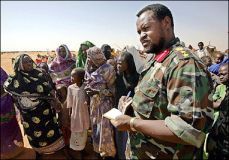Sudan accuses UN of criticizing govt while ignoring rebel violence
By MOHAMED OSMAN, Associated Press writer
KHARTOUM, Sudan, Nov 6, 2004 (AP) — A Sudanese Cabinet minister slammed the latest U.N. report on Darfur, accusing the world body Saturday of overlooking violence committed by African rebels while pouncing on trivial matters that make the government from the Arab-dominated north look bad.

|
|
A member of the Africa Union ceasefire commission questions a group of displaced women in a section of the Abu Shouk displaced camp in the outskirts of El-Fasher, Sudan.(AFP). |
Humanitarian Affairs Minister Ibrahim Hamid said the international community must pressure rebel groups, and not the government alone, to end the 20-month conflict in Sudan’s three western Darfur states.
“The silence of the Untied Nations and its reluctance to denounce the rebels and exercise pressure on them has encouraged the rebels to go on with their violations and spur insecurity,” Hamid told reporters in the Sudanese capital, Khartoum.
“We believe … the international community should exercise pressure on the rebels instead of seeking to condemn the government over minor issues.”
Hamid was commenting on the latest Darfur report presented Thursday to the United Nations Security Council by the world body’s top envoy to Sudan, Jan Pronk.
Pronk’s report said violence in Darfur intensified in October and there are strong indications of war crimes “on a large and systematic scale.”
It also accused the government and rebels of trying to take more territory instead of complying with U.N. demands to end violence, disarm militias and punish the perpetrators.
It urged “prompt action” from the Security Council to secure compliance.
A draft Security Council resolution, drawn up by Britain, began circulating among Security Council members Friday, urging warring parties in western Darfur and the much longer civil war in the south to reach peace agreements. It also holds out the promise of international support and possible debt forgiveness if they do.
But the draft also reiterates that the Security Council will consider “further urgent action” against any party in the Darfur conflict failing to implement an April 8 cease-fire, protect civilians, cooperate with African Union peacekeepers, disarm militias and prosecute the perpetrators of atrocities.
Sudanese officials have not yet commented on the draft.
International agencies estimate that since March, disease, malnutrition and some clashes among those made homeless by the violence have killed more than 70,000 of Darfur’s displaced. Many more have been killed in fighting since the conflict broke out in February 2003, although no firm estimate of the direct toll of the war yet exists.
The Sudanese government is accused of backing Arab militiamen called the Janjaweed in a campaign of violence — including rapes, killings and the burning of villages — to help put down the rebels, who are non-Arab Africans. The government denies backing the militias. The Arab militias and African groups are both Muslim.
Hamid on Saturday called on the United Nations to work with the Sudanese government “to prevent the spread of sedition” in Darfur where he claimed rebels are trying to stir up tribal unrest.
“The rebels have not been put under any pressure or condemnation,” he said. “Instead it has been the government which is being blamed even for trivial matters inside Nyala last week.”
Hamid was referring to the forced removal of thousands of displaced African villagers from the El-Geer refugee camp near Nyala, the capital of South Darfur state, to another camp. U.N. and African Union officials said the El-Geer camp was later destroyed.
The Cabinet minister said rebels have not been condemned for abducting 18 Arab villagers last week near the West Darfur town of Zaleinge or attacking police units deployed under a U.N.-government agreement to stabilize the volatile region, which is the size of France.
Peace efforts underway in the Nigerian capital, Abuja, took a step backward Saturday with Sudan’s government reiterating its rejection of a no-fly zone over Darfur, threatening hopes for the first, partial accord after months of African Union-sponsored talks.
The head of the Sudanese government delegation, Majzoub Khalifa, told The Associated Press he was insisting that African Union mediators scrap the latest draft security accord with its no-fly zone and return to a version not mentioning a military flights ban.
Sudan’s Arab-dominated government is accused of bombing non-Arab villages in Darfur in coordination with Janjaweed ground attacks.
Allam-Mi Ahmad, the chairman of the Abuja talks, said mediators are unwilling to change the wording of the document now on the table, adding that talks would continue for no more than another week — and might be suspended if no agreement is reached during that time.
Two previous rounds of talks have failed to produce even partial accords.
“The government is just wasting our time. For three days we have just been waiting for them to sign,” said Justice and Equality Movement spokesman Ahmed Hussain Adam.
